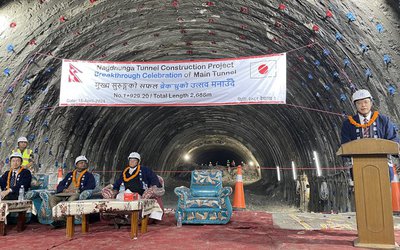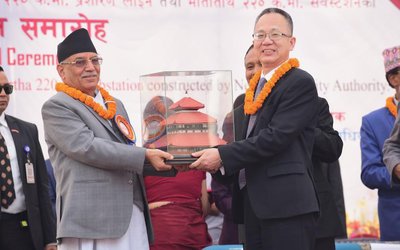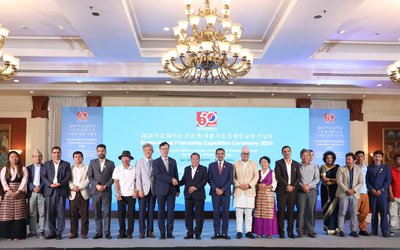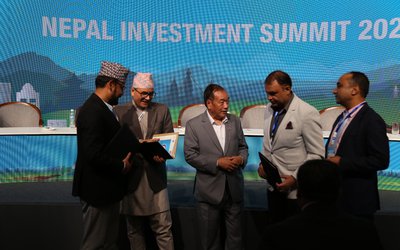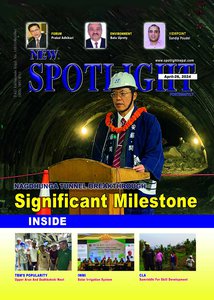The civil service is the permanent mechanism of the state. The effectiveness of the state depends on the capacity of the state to a large extent. The government which is political in nature keeps changing. The civil service is also called as the permanent government because civil service employees stay in their posts for a longer limited time. In a democratic governance system the civil service employees are the main advisors and important assistants. The civil service provides help to the government in policy and decision making according to their expertise. Not just that but the civil service has an important role in implementing the law of the land. In summary the civil service provides service to the people, assists the government in creating and deciding policies, and ensures the effectiveness of the governance. For this the civil service must be able to provide quality service and be accountable towards the government and the law. The values and professionalism of the civil service is reflected by the laws related to civil service.
Nepal’s civil service: Legal provisions and exercises
Throughout history Nepal’s governance has been dictated by culture, tradition, and beliefs and its civil service employees recruited and administered as per the wishes of the rulers. The first time legal provisions were established with the objective of choosing capable and qualified persons for the civil service was through the establishment of the “Recommendation Council” created in 2004 BS as per the law of Nepal then. After Nepal’s Interim Governance Bill, 2007 was established the Civil Service Commission structure began to take shape for the purpose of appointing civil service employees according to the merit system. The Civil Service Act, 2013 was announced to give permanence to the civil service as per the suggestions and recommendations of the Buch Commission established in 2008 BS, and the Administration Improvement Commission created in 2013 BS both of which were formed to strengthen the civil service. Various governments have been creating various commissions and committees with the intention of improving the civil service and encouraging the morale of the civil service employees who are serving the public and the nation. In this context the Civil Service Act 2049 was proclaimed in 2049 BS to increase the quality of Nepal’s civil service and make it more effective, competitive, service oriented, capable, improved and service focused. However because the acts and laws related to civil service were amended from time to time for personal gains the civil service administration is still not as developed as it should be. Nepal’s civil service is still not as stable. Problems remain due to factors such as constant changes in the organizational character and shape in the name of improvement, inability to develop a work culture based on professional values, lack of organizational development, lack of motivational factors, the culture of avoiding responsibility, political interference, lack of trust, instability in the name of correction, lack of proper use of reward and punishment. There is no doubt that in a democratic state system, the civil service should be independent, unbiased, professional, respected, and not just symbolic but actual effective too. Whatever efforts have been made to make Nepal’s civil service competitive, responsible, and effective, it has still been unable to develop. Politicization has severely affected the civil service. Due to the race to strengthen political parties hold over the administration, the civil service has been unable to develop professionally. There is widespread politics in the civil service in the name of professional organization. The core values of the civil service have not been able to be followed, promoted or institutionalized. Works are more process oriented than result oriented. The positioning, relocation, promotion, relegation, and rewarding of the human resources within the civil service, are yet not as scientific so as to make the management predictable. Unless relocation and promotion process can be made transparent there will not be as much attraction towards the civil service.Various challenges such as the compulsion to work in a politicaly unstable environment, lack of commitment to professional values, effect of party politics, lack of vision in making amendments force Nepal’s civil service to be where it is. Corrections should be made keeping in mind that there needs to be a fine line between politics and administration to make the civil service progressive and strong.
Promotions within the civil service are in reality not relative, scientific or predictable. Because the evaluation of work is yet unscientific there is the tendency to try and please the bosses. There is a need for a more secure system to ensure that those who are worthy and capable get the deserved promotion. There is a need to have a better system for promotion. There are no indications for multi-approach promotional system as per the international norms. It will be more appropriate to use a system that identifies the entry group or batch as the base, and promote starting from Section Office to specialization.
The speciality of the civil service is the merit system. Because current activities show that there is more focus on other factors rather than meritocracy, there needs to be corrections in the law to honor and protect meritocracy so that the civil service does not come to lack intelligent persons and capable, qualified, and talented individuals do not leave the country and are attracted towards civil service.
The Civil Service Act and Regulations need to be amended as per the suggestions and recommendations of the Administrative Restructuring and Improvement Commission inorder to make the civil service more capable, service oriented and accountable. While improving the Civil Service Act and Regulations the posting and promotion system should be made predictable.
The provision for promotion through evaluation of work and experience as per the Civil Service Act 2049, Article 24 C, is not in line with the fundamental values and norms of civil service, such unhealthy trends must be stopped and those who are already promoted should be reposted and integrated immediately.
The issue of professional associations within the Civil Service must be given a thought to make the Civil Service more honorable. Various wrong trends have been established due to political parties patronizing professional associations which compete to show their strength by faking the number of members they have rather than showing their actual numbers. Such trends to create fake membership within the professional associations have resulted in various corruptions within the system, and created an uneasy atmosphere with regards to posting and promotion due to the unhealthy activities of the associations, as have been claimed by long time civil service employees. There needs to be elections for an official trade union and legal provisions put in place to make the activities and roles of the employee trade unions more honorable.
Third Amendment Bill of the Civil Service Act 2049, 2068
The Civil Service Act 2049 was proclaimed to make the Civil Service more capable, improved, service oriented, accountable, professional and honorable, and reflect a sense of security to the employee about the service, provisions related to the filling of posts, promotion, reposting, and other perks. The First Amendment was done in 2055 while the Second Amendment was done in 2064. The Third Amendment Bill was presented in the Legislative Parliament in 2068 BS, to address issues related to filling vacant posts, reposting, and promotion with the following intentions:
· Correcting the current promotion system and considering the work efficacy and seniority as the main basis while promoting to vacant posts
· Management of employees who have been promoted on the basis of the evaluation of their work and experience
· Increase the age limit to increase the number of physically challenged people in the civil service
· Make the reposting system more managed to give continuation to the service
· Honor those who have been working as temporary Women Development Officer for a long time, provide social security and reevaluate their service period
Fundamental Special Aspects of the Proposed Amendment Bill
· While filling vacant posts seniority will be taken as the main basis, while for the classless, non gazetted fifth level posts 70% will be filled through open competition, 20% through internal competitive examination, 10% through evaluation of seniority and work efficacy. For the non gazetted First Class post, 40% will be through open competition, 20% through evaluation of working capacity and 40% through seniority and work efficacy. Gazetted Third Class posts will be filled through 70% open competition, 30% through seniority and work efficacy; for Gazetted Second and First Class posts 10% through evaluation of working capacity, 35% through internal competitive examination, 20% seniority and 35% through evaluation of working capacity. This proposed system has given more priority to seniority in the current system.
· For Gazetted Special Class Secretary or posts equal to that, only those who have achieved 95% or above in the evaluation of their work efficacy will be considered while in the Gazetted First Class posts those with the most experience will be promoted and of the vacant posts 20% will be given to seniority. Of the remaining vacant posts for which the promotion committee has recommended thrice the amount required 80% will be filled through evaluation of work efficacy. As the system has separated a specified percentage for seniority it aims to increase the morale of those who have in service for a long time.
· As it seems appropriate to give priority to work efficacy and seniority experience in the promotion system, it might not be relative to give different marks on the basis of educational qualification for different levels. Therefore provisions have been made to give 9 points to the achievement of required academic qualification during the entry phase and three points to achievement of higher levels on the concerned subject.
· In the regular promotional system corrections will be made to give priority to seniority, and while making promotions in such manner there will also be evaluation of work efficacy educational qualification, trainings and experience in different geographical areas. In evaluating in such manner, those who receive 95% percent marks, and have a minimum of SLC level education for non gazette posts are to be considered whereas for Gazetted Second Class posts a minimum of Bachelors and trained for at least one month in the concerned service, and with experience of having worked in such geographical conditions will be considered for promotion.
· Inorder to manage and integrate those employees who have been promoted on the basis of work efficacy and experience, a pool assigning will be created; those who have been promoted and appointed in such manner or those who are yet to be appointed will be integrated in such pool assigning, their current posts will automatically be vacant once they receive such appointments.
· Inorder to avoid having vacant posts due to reposting of employees recommened through open competition and promotion, who although are recommended on the basis of their qualification, might be reposted without completing their term, legal provisions have been made making it mandatory for them to complete their first tenure before being reposted.
· To make positive discrimination a reality and increase the number of physically challenged in the civil service, the age of those with physical challenges who wish to enter the civil service through open competition has been raised to 40 years
· For those women employees who are working in permanent Women Development activity in a temporary manner, their service period will be begun to be counted within 60 days of their appointment being made permanent.
Notes and Suggestions on the Bill
This Bill seems to be addressing only provisions related to promotion rather than attempting to address problems in general related to the Civil Service Act 2049 and that too in a temporary manner. The bill seems to have concentrated more on integrating past promotions, proposed giving priority to seniority and attempted to only address a few problems related to women employees working in permanent Women Development Program posts.
Nepal’s civil service has not been able to turn professional, result oriented, and institunalized because of political instability, political interference in the beaurocracy, employees undertaking other means to get lucrative posts, increasing numbers role and political influence of employee trade unions, unscientific and irelative manners of promotion, reposting, academic leave among many others. It is therefore important that this reality be given a serious thought, the entire Civil Service Act 2049 be re-analyzed, and amended accordingly, suggestions taken from relavant experts committees, and their recommendations be integrated to amend the Civil Service Act 2049.
This research and recommendation paper was prepared by constitution and legal analyst Kashiraj Dahal for the Nepal Constitution Foundation with inputs from women, indigenous peoples communities, Madhesi, Dalit, youth and other related pressure groups. The Foundation is grateful to Dr. Sushmita Singh, Dr. Govinda Prasad Kusum, Bhojraj Pokharel, Khadag Bahadur Biswakarma, Ang Dawa Sherpa, Nirupama Yadav, Ram Kapali, Bhimdev Bhatta, Bharat Raj Gautam, Hari Upreti, Rajendra Bahadur Singh, Shayam Kumar Biswakarma, Keshav Raj Pandey, Abhishek Adhikari, Phurpa Tamang, and Dr. Bipin Adhikari.
This research has been supported by The Asia Foundation and opinions expressed in this report are of the authors and don't necessarily reflects of The Asia Foundation.
- QATAR AMIR’S STATE VISIT: Five Agreements
- Apr 28, 2024
- BIPIN JOSHI: Call For Release
- Apr 21, 2024
- TANAHU HYDROPOWER PROEJCT: A Significant Achievement
- Apr 15, 2024
- AMBASSADOR HANAN GODAR: Sharing Pain With A Nepali Family
- Mar 30, 2024
- VISIT OF KfW AND EIB TO NEPAL : Mission Matters
- Mar 25, 2024







